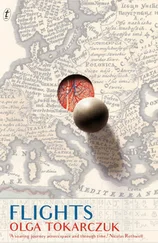Biddy sat back down next to Laura. “Who’s Frank Borman?” she whispered. He didn’t know. They watched more of the unpacking — fish, five or six packages of it, and club soda — before going outside to explore the new drifts the wind and snow had created the night before and was reshaping even as they played.
He’d put off going to Confession for three weeks and his mother wasn’t having any more of it. That was it, she said. No more screwing around. She was going over this afternoon and he was going with her.
Confession was between four-thirty and six on Saturdays, and it was now four-fifteen. Laura’s mother had picked her up earlier, honking the horn and waving from the car. He sat on the back porch, his rear end and knees wet and his feet cold. The dog lay on the floor nearby, dozing. One ear was flapped out as though he were listening through the floor for something.
His mother came into the kitchen from the bathroom, a lipgloss brush between thumb and forefinger. “Come on. Change your pants and shoes. I want to get back.”
He got laboriously to his feet and stepped out of his boots. As he passed through the kitchen he asked if Kristi was going.
“Kristi went last week.” His mother’s voice echoed faintly in the bathroom. “If you’d gone with her you wouldn’t have to go now.”
Upstairs he dug around in his closet and found his other pair of boots. They were olive drab but his pants could cover them.
“I don’t have any sins anyway,” his sister said from her bedroom.
“You got big ears, you know it?” He sat on the bed and pulled on his black pants.
“You got big everything,” she said.
He buckled his boots and left without answering. His mother already had the car warmed up. “Give ’em hell,” his father called from the den. “Don’t tell them about your old man’s drinking.”
The wind died at the church door, leaving them in a hushed quiet, the brightness of the afternoon shut out behind them. “Don’t rush your penance,” his mother said, and after that they were quiet, not to speak again until they were safely out of church.
There were five or six others present in a rough line in the pews, one behind the other. Biddy and his mother sat together. They swung the kneeling benches down and knelt, the creaking obtrusive but expected. He folded his hands in the adult manner, fingers interlocked casually. Only the young and the very pious folded them palm to palm with the fingers aligned. His mother bowed her head, and he tried to compile a list of sins at the last minute, vaguely uneasy at his lack of remorse. He had long since stopped believing he could accurately recount all of them, and had settled on one of Sister Theresa’s concessions during a discussion: whatever you can remember, as long as you don’t willfully leave anything out.
He glanced at his mother. Her head remained silent and still above her hands, her eyes gazing into the floor as if for support. Her intensity shook him. His eyes traveled to the Novena candles and from there to the Virgin Mary. He found himself taking stock, reviewing whether or not he was worthy to receive the grace and mercy that a Sacrament, even Confession, the most casual of sacraments, represented. He wondered if he was worthy of this church and these things around him.
He leaned back, surprised at his own sudden intensity, solemnity. Yet he was certain that all of this was in some central way good and that he had to in some way earn it, that he couldn’t simply continue to wander into the building and expect to be a part of it all. He shivered, rubbing the sleeve of his coat. He was taking stock of himself whether he wanted to or not, out of the blue, kneeling in the darkness beside his mother, and he wasn’t sure he knew how to do it.
He looked into the face on the crucifix. People shifted in the pews and an odd snort or gagging sound lingered in the silence. He didn’t know where he stood in the eyes of God.
He wasn’t, he knew, even sure God was present at times. Where did somebody who wasn’t even sure stand?
His mother rose as if in response and padded to the confessional curtain, pausing before slipping in. He was next, and his thoughts crowded against one another with urgency: he was basically good, he felt. He rarely willfully hurt anyone. He did what people said. He broke a minimum of commandments. So why was he not happy? The simplicity of it shook him. If he was good, why was he so unhappy? Why was he only sure of God on Christmas, if then? Why couldn’t he do more with Louis? Why did he always aggravate his parents?
His mother emerged from behind the curtain and passed silently into the nave for her penance. He hesitated until he heard the people behind him shifting expectantly, and then he got up and moved past the curtain into the dark.
He knelt on the wooden bench in front of the screen as his eyes adjusted. Father Rubino was picking at his eyebrow with his thumb and forefinger, looking off to his right.
“Bless me Father for I have sinned,” he said. “I haven’t been to Confession in three weeks.” He spoke in a whisper and Father Rubino wasn’t supposed to know who he was, but that was a fiction. He steadied himself on the partition. “I don’t know, Father. I was going to tell you all these things like lying and swearing. But that’s not right.” The boards beneath his knees groaned.
“What?” Father said. “What’s wrong with you?”
He was close to tears and felt foolish because of it. “I don’t know,” he repeated, and started to cry and hold it back at the same time. “I don’t think about God except at Christmas, I don’t help my sister at all, and sometimes I don’t like to be around my friend Louis and I know that’s wrong. I make my parents unhappy all the time.” He stopped, still not having heard any sort of response at all, having taken a chance and still not certain how to proceed.
Father was silent. Then he said, “Biddy, we all have those kinds of feelings. We all think maybe we could do more for other people. All we can do is try.”
Biddy knelt in the dark, wiping an eye with his hand.
“We can’t torture ourselves about it. All we can do is resolve to be better, to try harder.” Father paused. “Now tell yourself you’re going to work harder at it and try to live those words.” He moved around, apparently waiting for some response. “And Christ should certainly live in you always, not just at Christmas.”
Biddy looked down. “He doesn’t,” he whispered.
There was an awful silence. He waited for expulsion, public exposure, shouts, flashing lights. For the roof to lift off and God to pluck him away.
He could feel Father looking at him and he swallowed, ready to absorb whatever he deserved.
“Say twenty-five Our Fathers and twenty-five Hail Marys,” Father said. He absolved him in the name of the Father, the Son, and the Holy Spirit.
He stumbled to the altar, the air cool on his cheeks and ears, alternating the prayers while his mother waited at the back of the church. He was going to get out of here, he thought. He was going to change things or get out of here, because he was inadequate and everything around him was inadequate and no one seemed to care one way or the other. What was his penance? Did God expect only fifty prayers, as well? He finished his penance in the car on the way home, the houses reeling past as he avoided his mother’s gaze, feeling spiritually fraudulent beside her.
Ronnie sat across the table from him, his hat still on, losing at War. Something was bothering him and he was flipping the cards on his turns with irritation.
“Your turn, sport.” He tapped the table impatiently.
Biddy pulled a jack. Ronnie turned his card face up. A jack as well. Biddy laid three face down off the jack and turned over a two, sagging, trying to build up the foundations for some sort of drama. Ronnie was playing as if he were waiting for a train.
Читать дальше












